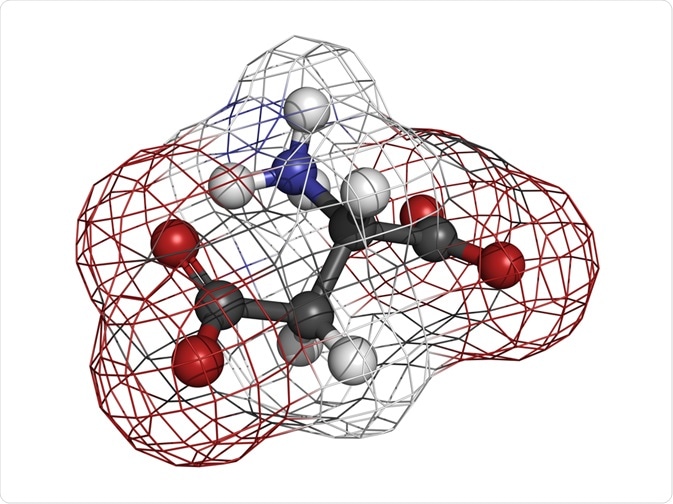Aspartic acid, also called aminosuccinic acid or aspartate, is a non-essential amino acid that is made naturally in the human body through dietary intake.

Image Credit: StudioMolekuul/Shutterstock.com
It has several uses, such as in the synthesis of proteins and the regulation of certain hormones, but it is also chemically synthesized to create dietary supplements, although its benefits as a supplement are widely disputed.
What is the role of aspartic acid in the body?
Aspartic acid is one of the building-block amino acids that are responsible for synthesizing proteins and regulating hormones in the human body.
Aspartic acid comes in two forms: L-aspartic acid and D-aspartic acid.
L-aspartic acid becomes part of proteins synthesized in the body and is responsible for encouraging the production of antibodies that support the function of the body’s immune system.
D-aspartic acid is not used to synthesize proteins. It is typically found in the pituitary gland and the testes, and is involved in the regulation, release, and synthesis of testosterone and luteinizing hormone (LH).
LH is responsible for regulating when a woman’s ovaries release an egg during her menstrual cycle and encouraging sperm production in men.
Aspartic acid is involved in the synthesis of four essential amino acids in humans: methionine, threonine, isoleucine, and lysine. Methionine is used in the metabolism; threonine is used in the central nervous system, the cardiovascular system, and the immune system; isoleucine is used in energy regulation; lysine is used in growth and muscle turnover.
What are the benefits of aspartic acid supplements?
Amino acids can be included in multivitamins, proteins, and food supplements, and are made in tablets, fluids, and powders.
However, as aspartic acid is not considered an essential amino acid, there is no need for a person to take aspartic acid supplements to increase its levels in the body to encourage the synthesis of amino acids. A diet with adequate amounts of protein will provide all of the amino acids the body needs.
Building muscle mass
Due to its role in the regulation of testosterone levels, D-aspartic acid has become a popular ingredient in supplements aimed at people who wish to build muscle mass and strength.
Studies into whether D-aspartic acid supplements result in an increase in testosterone levels and muscle mass and strength in men who weight train did not find any evidence proving the widely-reported benefits to be true.
Men in these studies experienced the same increase in muscle and testosterone whether they took D-aspartic acid supplements or a placebo.
Studies investigating the effects of aspartic acid supplements on testosterone levels have not resulted in conclusive results.
Increasing fertility
In a study including 30 men with reduced sperm motility (asthenozoospermia) and 30 men with a low sperm count (oligoasthenozoospermia), a daily dose of D-aspartic acid for 90 days resulted in a significant increase in both the amount of sperm and the motility of the sperm the men produced.
As a result, the rate of pregnancies in these couples also increased, which provides evidence that aspartic acid supplementation can have beneficial effects on male fertility.
There is less research available on how aspartic acid supplementation can benefit female fertility. One study that involved 20 women undergoing IVF treatment found that D-aspartic acid is linked to higher quality oocytes (immature egg cells), and higher fertility rates could be linked to higher levels of D-aspartic acid in follicular fluid, which is a fluid that surrounds a developing egg in a woman’s ovaries.
However, most of the research into the relationship between aspartic acid and fertility is focused on male fertility due to aspartic acid’s role in testosterone regulation.
 Image Credit: Just dance/Shutterstock.com
Image Credit: Just dance/Shutterstock.com
What are the side effects of aspartic acid supplements?
There are several detrimental effects on the body associated with the intake of aspartic acid supplements. This is because supplements that boost the intake of a single type of amino acid can lead to a negative nitrogen balance in the body.
A negative nitrogen balance means that the amount of nitrogen leaving the body through the urine is higher than the amount of nitrogen entering the body through the mouth. This can cause anemia, lower infection resistance, impaired metabolism, and the development of the fatty liver.
However, studies that included detailed blood testing of active men found no adverse effects resulting from D-aspartic acid supplement intake for 90 days.
It has been reported that women who are pregnant or breast-feeding should not take aspartic acid supplements. Many amino acid supplements are not regulated, and the doses reported on supplements may not be accurate.
All of the essential amino acids that can contribute to a healthy pregnancy are available through a varied diet.
Summary
Aspartic acid comes in two forms, L-aspartic acid, and D-aspartic acid, both of which carry out different functions in the body. Aspartic acid can be involved in regulating hormones and creating proteins in the body that aid a wide range of essential bodily functions.
Both of these types can be found in a varied diet, and as such, aspartic acid supplementation is not typically necessary in humans.
Although aspartic acid supplements are very popular among people who wish to build muscle mass and strength, there is little evidence to show that aspartic acid is beneficial for this use. Additionally, the research into the side effects of aspartic acid supplements is lacking.
More research is needed to fully ascertain whether increased levels of D-aspartic acid can increase fertility in both men and women, although there is evidence to suggest that male fertility can be improved with aspartic acid supplementation.
References
- D’Angel, N. et al. D-aspartate, a key element for the improvement of sperm quality. Advances in Sexual Medicine. https://www.scirp.org/journal/PaperInformation.aspx?paperID=24016
- D’Aniello, E. et al. Reproductive implication of D-aspartic acid in human pre-ovulatory follicular fluid. Human Reproduction. https://pubmed.ncbi.nlm.nih.gov/17951582/
- Hormone Health Network. (2018). https://www.hormone.org/your-health-and-hormones/glands-and-hormones-a-to-z/hormones/luteinizing-hormone
- Leutholtz, B., Willoughby, D. S., D-aspartic acid supplementation combined with 28 days of heavy resistance training has no effect on body composition, muscle strength, and serum hormones associated with the hypothalamopituitary-gonadal axis in resistance-trained men. Nutrition Research. https://pubmed.ncbi.nlm.nih.gov/24074738/
- Marshall, P. W. M., et al., The effects of D-aspartic acid supplementation in resistance-trained men over a three month training period: a randomised controlled trial. PLoS One. https://pubmed.ncbi.nlm.nih.gov/28841667/
- National Center for Biotechnology Information. PubChem Database. (N.D.). https://pubchem.ncbi.nlm.nih.gov/compound/Aspartic-acid
- University of Rochester Medical Center. Health Encyclopedia. (N.D.). https://www.urmc.rochester.edu/encyclopedia/content.aspx?contenttypeid=19&contentid=AsparticAcid
Last Updated: Mar 4, 2021